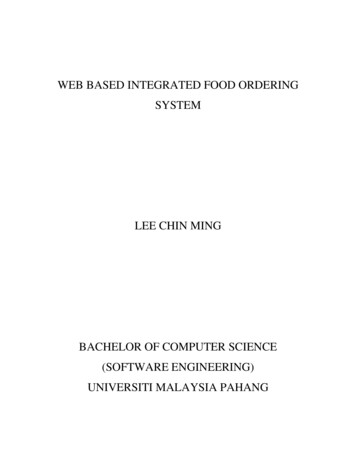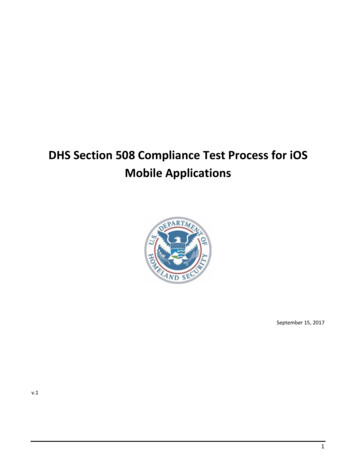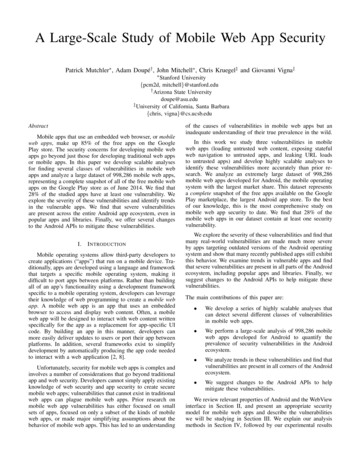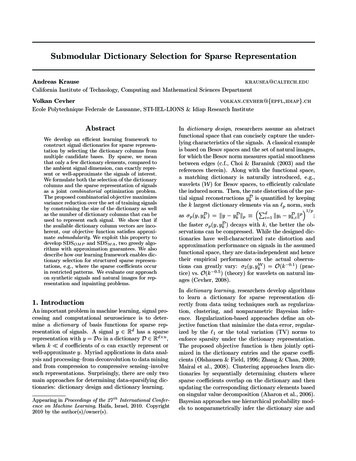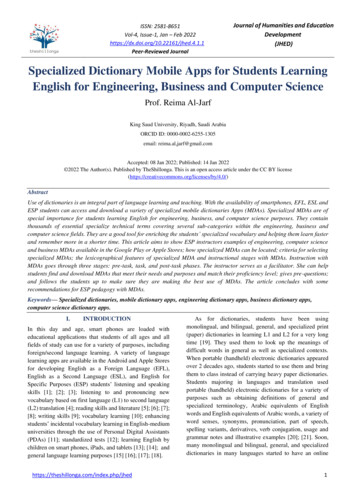
Transcription
ISSN: 2581-8651Vol-4, Issue-1, Jan – Feb iewed JournalJournal of Humanities and EducationDevelopment(JHED)Specialized Dictionary Mobile Apps for Students LearningEnglish for Engineering, Business and Computer ScienceProf. Reima Al-JarfKing Saud University, Riyadh, Saudi ArabiaORCID ID: 0000-0002-6255-1305email: reima.al,jarf@gmail.comAccepted: 08 Jan 2022; Published: 14 Jan 2022 2022 The Author(s). Published by TheShillonga. This is an open access article under the CC BY 0/)AbstractUse of dictionaries is an integral part of language learning and teaching. With the availability of smartphones, EFL, ESL andESP students can access and download a variety of specialized mobile dictionaries Apps (MDAs). Specialized MDAs are ofspecial importance for students learning English for engineering, business, and computer science purposes. They containthousands of essential specialize technical terms covering several sub-categories within the engineering, business andcomputer science fields. They are a good tool for enriching the students’ specialized vocabulary and helping them learn fasterand remember more in a shorter time. This article aims to show ESP instructors examples of engineering, computer scienceand business MDAs available in the Google Play or Apple Stores; how specialized MDAs can be located; criteria for selectingspecialized MDAs; the lexicographical features of specialized MDA and instructional stages with MDAs. Instruction withMDAs goes through three stages: pre-task, task, and post-task phases. The instructor serves as a facilitator. She can helpstudents find and download MDAs that meet their needs and purposes and match their proficiency level; gives pre-questions;and follows the students up to make sure they are making the best use of MDAs. The article concludes with somerecommendations for ESP pedagogy with MDAs.Keywords— Specialized dictionaries, mobile dictionary apps, engineering dictionary apps, business dictionary apps,computer science dictionary apps.I.INTRODUCTIONIn this day and age, smart phones are loaded witheducational applications that students of all ages and allfields of study can use for a variety of purposes, includingforeign/second language learning. A variety of languagelearning apps are available in the Android and Apple Storesfor developing English as a Foreign Language (EFL),English as a Second Language (ESL), and English forSpecific Purposes (ESP) students’ listening and speakingskills [1]; [2]; [3]; listening to and pronouncing newvocabulary based on first language (L1) to second language(L2) translation [4]; reading skills and literature [5]; [6]; [7];[8]; writing skills [9]; vocabulary learning [10]; enhancingstudents’ incidental vocabulary learning in English-mediumuniversities through the use of Personal Digital Assistants(PDAs) [11]; standardized tests [12]; learning English bychildren on smart phones, iPads, and tablets [13]; [14]; andgeneral language learning purposes [15] [16]; [17]; [18].https://theshillonga.com/index.php/jhedAs for dictionaries, students have been usingmonolingual, and bilingual, general, and specialized print(paper) dictionaries in learning L1 and L2 for a very longtime [19]. They used them to look up the meanings ofdifficult words in general as well as specialized contexts.When portable (handheld) electronic dictionaries appearedover 2 decades ago, students started to use them and bringthem to class instead of carrying heavy paper dictionaries.Students majoring in languages and translation usedportable (handheld) electronic dictionaries for a variety ofpurposes such as obtaining definitions of general andspecialized terminology, Arabic equivalents of Englishwords and English equivalents of Arabic words, a variety ofword senses, synonyms, pronunciation, part of speech,spelling variants, derivatives, verb conjugation, usage andgrammar notes and illustrative examples [20]; [21]. Soon,many monolingual and bilingual, general, and specializeddictionaries in many languages started to have an online1
Al-JarfJournal of Humanities and Education Development (JHED)4(1)-2022version [17]; [22]. There are even dictionary websites thathost numerous dictionaries in one location such aswww.onelook.com in English, and www.almaany.com inArabic. Further development in digital dictionaries haveoccurred in the past decade or so, with the creation andwidespread use of mobile apps for almost every traditionaldictionary such as Webster, Cambridge, Longman, Collins,and McMillan. Those can be accessed from any smartmobile phone, iPad, or tablet.popular among students. The students find them useful inlanguage learning but there are different viewpoints on thepotential of mobile apps for developing different languageskills. The type of apps used significantly shaped students'attitudes towards app-based language learning [29]. InHong Kong, mobile dictionaries facilitated incidental wordlearning significantly through consulting mobiledictionaries while reading [30]. At Al-Najah NationalUniversity, in Nablus, Palestine, students enrolled ineducational readings in English at the Faculty of SocialSciences and Teacher Training had a great and excitingexperience in using mobile dictionaries for learning newvocabulary. The students also had positive attitudes towardsmobile dictionaries [31].Due to the importance of digital, online dictionaries andmobile dictionary apps (MDAs) in language learning, areview of the literature has shown numerous studies thathighlighted the benefits of using MDAs in languagelearning such as learning Chinese, Turkish and English as aforeign language. For example, in China, secondary schoolstudents in rural areas use smartphones, followed byportable electronic dictionaries, tablets and laptops ininformal learning of English [23]. Similarly, studentslearning Turkish as a foreign language most often useGoogle Translate and Turkish English mobile dictionaries.The students’ interest level in using mobile dictionaries wasrated 'good' [24]. At an Australian university, [25] foundthat all students enrolled in language courses across tenlanguages in the first-, second- and third-year level useelectronic dictionaries to look up unknown words or obtaintranslations. Many students' comments reflected theirknowledge of the effective use of electronic dictionary toolsand awareness of their limitations.In Hong Kong, [26] found that MBAs are essential toolsthat help college students in L2 learning and in academicstudies. Bilingual dictionaries with multiple functions andrich resources help the students engage in learning thesubject courses and learn English at the same time.However, discrepancies exist in the students’ actual anddesired use of dictionary functions. Undergraduate studentsin Taiwan, who used handheld electronic dictionaries tolearn English, reported that those dictionaries were usefuland fun. Use of handheld electronic dictionaries positivelycorrelated with students’ satisfaction with English mobilelearning. Self-management of learning could moderate therelationships between key mobile English learningdeterminants, satisfaction, and continued intention [27].Moreover, [28] found that students had positive attitudesand emotions toward mobile learning, consisting ofanticipation, joy, surprise, and trust. However, there werenegative emotion of apprehension and anxiety whilecommunicating in a foreign language.A second line of research investigated the effects ofusing digital, electronic, and mobile dictionaries onvocabulary acquisition in L2. At Amirkabir University ofTechnology, in Iran, dictionary and lexical apps are veryhttps://theshillonga.com/index.php/jhedA third line of research compared some dictionary typesand the effects of teaching strategies on vocabularylearning. A study by [32] investigated the effects of types ofdictionaries used on lexical proficiency in writing byintermediate level students preparing for the TOEFL.Bilingual English-Persian Desk Dictionaries were the mostfrequently used, whereas Bilingual Persian-English DeskDictionary and Bilingual Persian-English MobileDictionary were the least favoured dictionaries among thestudents. Consulting dictionaries to obtain meaning duringthe reading-writing, and after listening-speaking tasks werethe most common habits among the students. There was asignificant correlation between the dictionary type used andstudents’ lexical proficiency in writing and betweenstudents’ skill in dictionary use and their lexical proficiencyin writing.Another study by [33] compared the influence ofelectronic dictionaries vs. paper dictionaries on vocabularylearning and retention of Iranian EFL students. Resultsindicated that students in the electronic dictionary groupoutperformed those of the paper dictionary group. It wasconcluded that electronic dictionaries can improvevocabulary learning.In a third study by [34], freshman students with upperintermediate proficiency level were taught 320 head wordsfrom the Academic Word List via SMS, whereas the controlgroup was taught the same words using a dictionary. Bothgroups made improvements with no significant differencebetween them in the post-test scores. However, on thedelayed post-test, the experimental group outperformed thecontrol group, i.e., SMS learning had a more significanteffect on vocabulary retention than dictionary usage. Theresearchers recommended that language instructors useSMS as a useful way to help students retain vocabularyitems in their long-term memory.Furthermore, the literature review has shown thatdespite the widespread growth in the use of smartphones,2
Al-JarfJournal of Humanities and Education Development (JHED)4(1)-2022iPads and tablets, which have facilitated a plethora of newmobile language learning applications in all languagesespecially English, there is still a dearth of studies thatinvestigate the utilization of specialized MDAs in theteaching of English for engineering, business and computerscience purposes at colleges of science and technology suchas the Ibri College of Technology in Oman. In this respect,[33] indicated that vocabulary learning needs specialteaching strategies and language learning process. The useof dictionaries is a great help in vocabulary learning and theemergence of electronic dictionaries has added a new andvaluable resource for vocabulary learning. Mobile phoneapps are a new addition to information and communicationtechnologies which have created new ways to help studentsin learning specialized technical terminology inengineering, business, and computer science. [30] addedthat although the dictionary format is significant, dictionarytraining is indispensable.specialized MDAs at their own convenience for free. EvenESP instructors with little knowledge in engineering,business or computer science can acquire specializedtechnical terms in those areas by searching MDAs.At colleges of technology, students studying English forengineering, business and computer science purposesusually focus on their assigned textbooks and many are notfamiliar with relevant engineering, business, and computerscience MDAs. Many instructors teaching English forengineering, business and computer science purposes arespecialized in English or linguistics but they are not familiarwith engineering, business and computer science MDAs inthose areas of specialty, and do not know how to integratethem in teaching English to freshman students majoring inengineering, business and computer science.Since ESP instructors play an important role in guidingstudents' lexical learning of specialized technical terms, thisstudy aims to introduce ESP instructors to: (i) the types ofengineering, business, and computer science MDAs, theirlexicographical features, different learning modes, and howwords can be located, browsed, learnt and revised; (ii) thebenefits of using MDAs; (iii) how to search MDAs; (iv)criteria for selecting engineering, business, computerscience MDAs; (v) stages of teaching with engineering,business, computer science MDAs; and (vi) the ESPinstructor’s role in training students to use specializedMDAs.This study is significant because specialized MDAs area well-established aid for learning English technical termsin the students’ area of specialization. Many studentslearning English for engineering, business and computer inEnglish-medium colleges and universities struggle whenthey have to learn specialized technical terms, facts, orfundamental concepts in English. In some cases, studentstaking ESP courses are even unsure about what they shouldstudy and how they can broaden their knowledge oftechnical terms. The students can use a multitude ofhttps://theshillonga.com/index.php/jhedII.WHY USE SPECIALIZED MOBILEDICTIONARY APPSStudents learning English for engineering, business, orcomputer science purposes can enrich their technical termsin their area of specialization by using MDAs specialized inengineering, business, or computer science as these containthousands of technical terms. A variety of specializedMDAs in a specific area exist which students of differentproficiency levels (beginners, intermediate and advanced)can use. ESP students can check the meanings of difficulttechnical terms in a short time. They learn faster andremember more. The students can use specialized MDAs forself-testing. They can check their MDAs anywhere, anytimeand as many times as they need.III.SEARCHING FOR ENGINEERING,BUSINESS AND COMPUTER SCIENCEMDASThe instructor may search the Google Play and/or AppleApp Stores for engineering, business or computer scienceMDAs targeting a specific area of specialization within thegeneral field by selecting specific search terms such gdictionaries”, “business dictionaries”, “economicsdictionaries”, “computer dictionaries”, “informationtechnology dictionaries” and so on. She can enclose thesearch terms in quotation marks, and use Boolean operators(&, or, not) to narrow the search. It is important to add“English” in order to get more accurate results and to avoidgetting MDAs in other languages. Once a search term isentered in the search box, Google Play will suggest relatedsearch terms that can be tried. The students can also locate,select, and suggest MDAs for specific sub-fields such as: Engineering: mechanical, electrical, chemical,environmental, electronics, software, cal,biomolecular, environmental, food, genetic, materialsscience, petroleum, plastics, textile, tural,mechatronics, microelectronic, optical, eronautical, aerospace, agricultural, astronautical,automotive, energy, marine, manufacturing, powerplant, renewable energy, thermal, industrialengineering and others.3
Al-Jarf Journal of Humanities and Education Development (JHED)4(1)-2022Business: management, economics, finance, logistics,planning, corporate, accounting, marketing, humanresources, banking, international business, hotelmanagement, e-commerce, e-business, hospitaladministration, entrepreneurship, supply chainmanagement, project management, data analysis,investments and securities, ecommunications, networking, network security,information security,information technology,information systems, information science, artificialintelligence, computer software and applications,computer systems networking, data processing, datamining, computer information systems. hardwareengineering.For examples of MDAs in engineering, business andcomputer science, see Images 1, 2, 3 in the Appendix.IV.FEATURES OF SPECIALIZEDENGINEERING, BUSINESS ANDCOMPUTER SCIENCE MDASSpecialized MDAs have a letter index, a category index, oran alphabetical index. Students can enter the term they wantlook up in the search box or they can browse the list of termsunder a particular letter. They may also search in a particularcategory. Some MDAs have a tutorial, a guide, videos,quizzes and/or “Term of The Day”. Some business MDAshave a loan calculator. Specialized MDAs generally give thedefinition of a technical term or an acronym. The studentscan also enter a letter in the search box and get analphabetical list of the technical terms that begin with thatletter, browse through the list and select the term they arelooking for. The students can bookmark the words whichthey have looked up and would like to save for later. Theycan use the quizzes to assess their vocabulary knowledge orlearning, or retention (See Images 4, 5, 6, 7, 8 in theAppendix).On the other hand, specialized MDAs have someshortcomings such as: having ads, giving the definition ofthe term only, not showing how a term is pronounced, notgiving the part of speech nor other words derived from theterm. In some specialized MDAs, the students have to enterthe word they are looking for and may not find it if theymisspell it and they do not see a list of options inalphabetical order. In many MDAs there are no illustrationsto clarify the meaning especially in ndex.php/jhedV.CRITERIA FOR SELECTINGENGINEERING, BUSINESS ANDCOMPUTER SCIENCE MDASThe MDAs selected should be related to the students’ areaof specialty. The instructor can download several MDAs,that target a particular subspecialty to accommodate thestudents’ different proficiency levels, interests, needs,learning styles and even to be familiar with different MDAdesigns and content. MDAs chosen should contain enoughmaterial for practice. The instructor should take intoconsideration the difficulty level of the terms within theMDA, degree of familiarity and complexity and contentdetails. The instructor can look at the MDAs star ratings andread the users’ reviews and comments. She may try severalMDAs in an engineering, business, or computer sciencesub-specialty before deciding which ones are useful andappropriate for the students. She can select those that arefree of charge and easy to use by the students.VI.INSTRUCTIONAL STAGES WITHSPECIALIZED MDASInstruction with MDAs goes through 3 phases. In the PreTask Phase, the instructor tells the students which MDAsthey need to locate, download, and use. She shows thestudents how to search Google Play or the Apple App Storesfor specialized MDAs targeting a specific area of specialty.She tells the students about the MDAs to be used. She postsa sample of MDAs on a Learning Management System(LMS) such as Microsoft Teams, Zoom, Google classroom,Blackboard, a blog, an online discussion forum, onFacebook, Twitter, WhatsApp, or Telegram. She states theobjective of using the MDAs, i.e., tells the students whatthey are going to do, study or practice and how they aregoing to use the MDAs. She gives clear, specific, anddetailed instructions on how a particular task should beperformed. She tells the students what is expected of them,how many MDAs they need to complete and sets a deadlinefor completing the assigned MDAs.In the Task Phase, the students work with the MDAs ontheir smart phones, tablet, or laptop at home or in class. Theywork on MDAs individually, in pairs or small groups. Theypost queries, comments, and evaluations of the MDAs theyhave used on an LMS or a social media network. Theinstructor answers students’ questions, provides guidance,and help with difficulties.In the Post Task Phase, the ESP instructor givesfeedback and comments on the students’ performance. Sheencourages the students to use specialized MDAs in theirarea of specialization and gives credit for using them. Thestudents correct their classmates’ errors and makecomments on each other’s performance. They keep a log of4
Al-JarfJournal of Humanities and Education Development (JHED)4(1)-2022the MDAs they have used with their evaluation of andcomments on each.competence by modifying the type of MDAs they use,understanding students’ choice of MDAs, and their habitsin using MDAs.VII.THE ESP INSTRUCTOR’S ROLEThe ESP instructor serves as a facilitator. She helps thestudent enrolled in English for engineering, business, orcomputer sciences courses in locating and downloadingrelevant MDAs that meet their needs and purposes. Shematches the students’ English proficiency level with thespecialized MDAs difficulty level. She encourages thestudents to fully engage in the MDA activities. She followsthe students up to make sure they are making the best use ofthe MDAs. She gives extra credit for using MDAs in theirESP courses depending on how many they have completed.Technical terms learnt from MDAs may be included on ESPtests to motivate the students to take the MDA activitiesseriously.VIII. RECOMMENDATIONSESP instructors teaching English for engineering, businessand computer science purposes should exploit latestadvancements in mobile technology to help ESP studentsdevelop their English proficiency level and learn how tosearch specialized MDAs. Specialized MDAs allowstudents to use their visual and auditory senses to learndifficult technical terms. ESP instructors should alwaysremember that MDAs do not teach by themselves, and theiruse does not guarantee the automatic learning and recall ofthe specialized technical terms. ESP instructors shouldencourage their students to engage in, respond to, and beactively involved in activities with MDAs. They shouldsupervise students, give them feedback, guide them, andencourage them. Students may use specialized MDAs oftheir choice. Those who do not own a smart phone mayaccess specialized online dictionaries using their laptopcomputer.To make the best use of MDAs, the ESP instructor mayintegrate different elements of word knowledge with onlineword activity designs, direct instruction on specifictechnical terms, and students' awareness of specialized termselection. To make technical term and content technicallearning more effective, the students can browse and locateterms of interest to them on their own. Since ESP students'satisfaction, perceived difficulty of MDAs and level ofcontrol over MDAs affect their performance, selectedspecialized MDAs should have a variety of formats anddesigns. ESP instructors can prepare a taxonomy ofavailable MDAs in a specific area together with their use forlanguage learning based on the students’ experience. ESPinstructors can enhance students specialized lexicalhttps://theshillonga.com/index.php/jhedThe utilization of different MDA formats by studentslearning English for engineering, business, or computerscience together with their preference and views on theirusefulness in specific contexts, are still open for furtherinvestigation by researchers in the future.REFERENCES[1]Al-Jarf, R. (2021e). Mobile audiobooks, listeningcomprehension and EFL college students. InternationalJournal of Research – GRANTHAALAYAH, 9(4), i4.2021.3868DOI: 10.2139/ssrn.3841694[2] Al-Jarf, R. (2021g). TED talks as a listening resource in eflcollege classrooms. International Journal of Language ndex.php/ijlls/article/view/691.ERIC ED615127.[3] Al-Jarf, R. (2012). Mobile technology and student autonomyin oral skill acquisition. In J. E. Díaz Vera (Ed), Left to MyOwn Devices: Innovation and Leadership in org/10.1163/9781780526478 007[4] Zubenko, T. & Shwedel, A. (2019). Integrating mobilelistening and physical activity to facilitate intentional andincidental vocabulary acquisition. Advanced Education, 11,84-92.[5] Al-Jarf, R. (2021c). Collaborative mobile ebook reading forstruggling EFL college readers. IOSR Journal of Research& Method in Education (IOSR-JRME), 11(06), 32-42.DOI: 10.9790/7388-1106023242. Accessed Vol11%20Issue-6/Ser-2/D1106023242.pdf[6] Al-Jarf, R. (2016). Enhancing reading and speaking skills inEFL through multicultural literature. Asian AcademicJournals of Social Sciences and Humanities (AAJSSH), 3(7)(July), 288-298.[7] Al-Jarf, R. (2015). Enhancing reading and speaking skills inEFL through multicultural children's short stories. 7thInternational Conference Building Cultural Bridges(ICBCB), Almaty, Kazakhstan, April 23-24, 2015. ERICED610158. https://doi.org/10.2139/ssrn.3848464[8] Hazaea, A. & Alzubi, A. (2016). The effectiveness of usingmobile on EFL learners' reading practices in NajranUniversity. English Language Teaching, 9(5),8-21.[9] Al-Shehab, M. (2020). The role of mobile-assisted languagelearning (MALL) in enhancing the writing skills ofintermediate IEP Students: expectations vs reality.Language Teaching Research Quarterly, 20, 1-18.[10] Kohnke, L. & Ting, A. (2021). ESL students' perceptions ofmobile applications for discipline-specific vocabularyacquisition for academic purposes. Knowledge Management& E-Learning, 13(1), 102-117.5
Al-JarfJournal of Humanities and Education Development (JHED)4(1)-2022[11] Song, Y. & Fox, R. (2018). Using PDA for undergraduatestudent incidental vocabulary testing. ReCALL, 20(3), 290314.[12] Al-Jarf, R. (2021f). Standardized test preparation withmobile flashcard apps. United International Journal forResearch & Technology (UIJRT), 3(2), eparation-withmobile-flashcard-apps.[13] Al-Jarf, R. (2021b). Differential effects of the iPad on firstand second language acquisition by Saudi children duringthe Covid-19 pandemic. The 17th International ScientificConference eLearning and Software for Education (eLSE),Bucharest, Romania. Vol. 1, pp. 96-105. DOI:10.12753/2066-026X-21-013.[14] Al-Jarf, R. (2021d). Impact of the iPad on Saudi youngchildren in the home environment as perceived by theirmothers. International Journal of Research in Engineering,IT and Social Sciences (IJREISS), 11(2), 26-35, (FEB).ERIC ED613057.[15] Al-Jarf, R. (2021a). Blind Saudi female college students andassistive technologies: A case study. International Journalof Research in Engineering, IT and Social Sciences(IJREISS), 11(4), 1-9. ERIC ED613224. Accessed fromhttp://indusedu.org/pdfs/IJREISS/IJREISS 3780 72724.pdf[16] Al-Jarf, R. (2020a). Mobile apps in the EFL collegeclassroom. Journal for Research Scholars and Professionalsof English Language Teaching (JRSP-ELT), 4(22),1-5.ERIC ED613138.[17] Al-Jarf, R. (2020b). Arabic digital dictionaries. EurasianArabic Studies, 12(Dec), 16-42. Accessed al-dictionaries.[18] Ibrahim, A. & Kadiri, G. (2018). Integrating mobile phonesin teaching auditory and visual learners in an Englishclassroom. English Language Teaching, 11(12), 1-10.[19] Al-Jarf, R. (1998). Dictionary skills for translation 348602404[20] Al-Jarf, R. (2001). Electronic Dictionaries in TranslationClassrooms in Saudi Arabia. Linguistica Communicatio, 10,27-134. ERIC ED613066.[21] Al-Jarf, R. (1999). Electronic dictionaries in ESLclassrooms.5th Annual TESOL Arabia Conference on'Teaching Learning and Technology', 4, 42-51. ERICED613205.[22] Al-Jarf, R. (2014). Online Arabic-English-Arabicspecialized dictionaries. In M. Ángel Campos and J. RamónCalvo's (Eds), Investigating Lexis: Vocabulary Teaching,ESP, Lexicography and Lexical Innovations. ridgescholars.com/investigating-lexis[23] Guo, J., Huang, F., Lou, Y. & Shaomei, C. (2020). Students'perceptions of using mobile technologies in informalEnglish learning during the COVID-19 epidemic: A study inChinese rural secondary schools. Journal of PedagogicalResearch, 4(4), 475-483.[24] Baskin, S. & Yildirim, A. (2020). Interest levels on usingmobile dictionaries of students learning Turkish as a foreignlanguage in Turkey. African Educational Research Journal,8(2), 279-286.[25] Levy, M. & Steel, C. (2015). Language learner perspectiveson the functionality and use of electronic languagedictionaries. ReCALL, 27(2), 177-196.[26] Ma, Q. (2019). University L2 learners' voices and experiencein making use of dictionary apps in mobile assisted languagelearning (mall). international journal of computer-assistedlanguage learning and teaching, 9(4), Article 2, 18-36.[27] Huang, R. (2014). Exploring the Moderating Role of SelfManagement of Learning in Mobile English Learning.Educational Technology & Society, 17(4), 255-267.[28] Ilic, P. (2020). Sentiment analysis of students' attitudestoward mobile learning activities. 28th EUROCALLConference. ERIC ED611125.[29] Nami, F. (2020). Educational smartphone apps for languagelearning in higher education: students' choices andperceptions. Australasian Journal of EducationalTechnology, 36(4), 82-95.[30] Zou, D., Xie, H. & Wang, F. L. (2015). The use ofmonolingual mobile dictionaries in the context of reading byintermediate Cantonese EFL learners in Hong Kong. 22ndEUROCALL Conference, Padova, Italy.[31] Barham, K. A. (2017). The use of electronic dictionary in thelanguage classroom: The views of language learners. 2ndInternational Conference for Learning and Teaching in theDigital World. Nablus, Palestine. ERIC ED573437.[32] Vahdany, F., Abdollahzadeh, M., Gholami, S. & Ghanipoor,M. (2014). A study of the relationship between type ofdictionary used and lexical proficiency in writings of IranianEFL students. Advances in Language and Literary Studies,5(6), 31-38.[33] Rezaei, M. & Davoudi, M. (2016). The influence ofelectronic dictionaries on vocabulary knowledge extension.Journal of Education and Learning, 5(3), 139-148.[34] Alemi, M., Sarab, M. R. & Lari, Z. (2012). Successfullearning of academic word list via MALL: mobile assistedlanguage learning. International Education Studies, d6
Al-JarfJournal of Humanities and Education Development (JHED)4(1)-2022APPENDIXImage 1: Examples
Keywords— Specialized dictionaries, mobile dictionary apps, engineering dictionary apps, business dictionary apps, computer science dictionary apps. I. INTRODUCTION In this day and age, smart phones are loaded with educational applications that students of all ages and all fields of study can use for a variety of purposes, including
